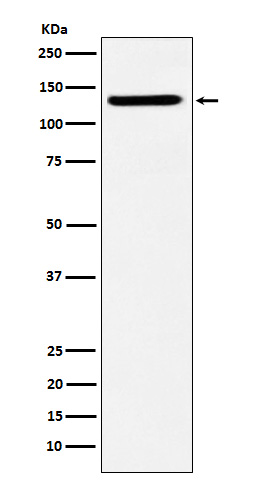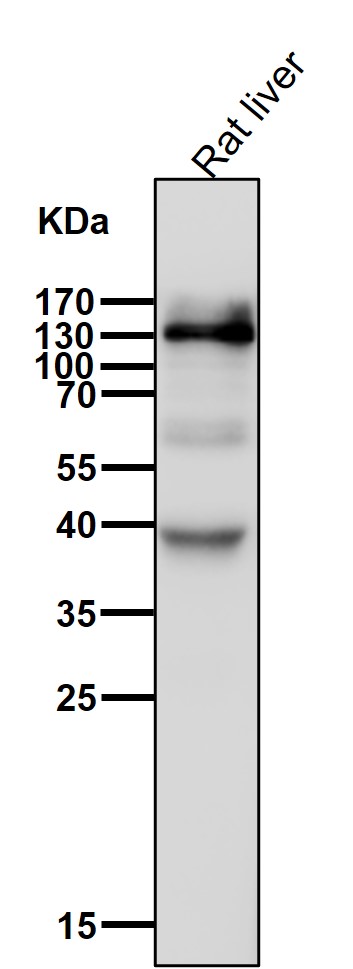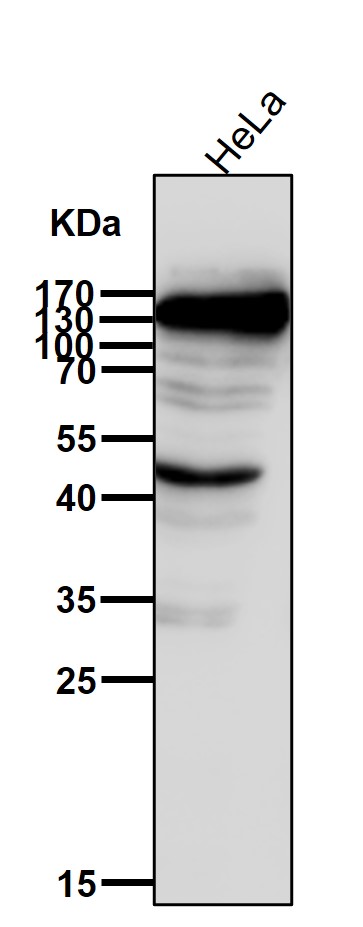


| WB | 1/1000-1/2000 | Human,Mouse,Rat |
| IF | 咨询技术 | Human,Mouse,Rat |
| IHC | IHC:1/100-1/200;IHF:1/50-1/200 | Human,Mouse,Rat |
| ICC | 1/50-1/200 | Human,Mouse,Rat |
| FCM | 1/20-1/100 | Human,Mouse,Rat |
| Elisa | 咨询技术 | Human,Mouse,Rat |
| Aliases | RSE1; SAP130; SF3b130; STAF130;;SF3B3 |
| WB Predicted band size | 136 kDa |
| Host/Isotype | Rabbit IgG |
| Antibody Type | Primary antibody |
| Storage | Store at 4°C short term. Aliquot and store at -20°C long term. Avoid freeze/thaw cycles. |
| Species Reactivity | Human,Mouse,Rat |
| Immunogen | A synthesized peptide derived from human SF3B3 |
| Formulation | Purified antibody in PBS with 0.05% sodium azide,0.05% BSA and 50% glycerol. |
+ +
以下是关于SF3B3抗体的3篇参考文献示例,涵盖不同研究背景和应用场景:
---
1. **文献名称**:*SF3B3 regulates RNA splicing in cancer pathogenesis*
**作者**:Zhang Y, et al.
**摘要**:本研究探讨了剪接体组分SF3B3在结直肠癌中的异常表达及其机制。通过Western blot和免疫组化(使用SF3B3特异性抗体),发现SF3B3在肿瘤组织中显著上调,并通过调控选择性剪接促进癌细胞增殖和迁移。
---
2. **文献名称**:*Functional characterization of SF3B3 in spliceosome assembly*
**作者**:Lee S, Kim JH.
**摘要**:利用免疫共沉淀(IP)和RNA干扰技术,结合SF3B3抗体,研究SF3B3在剪接体动态组装中的作用。结果显示,SF3B3通过与U2 snRNP相互作用,影响前体mRNA的剪接效率,为剪接机制提供了新见解。
---
3. **文献名称**:*SF3B3 mutations disrupt neuronal development via aberrant splicing*
**作者**:Wang X, et al.
**摘要**:在小鼠模型中,通过免疫荧光(使用SF3B3抗体)和RNA测序分析,发现SF3B3突变导致神经元分化异常。研究揭示了SF3B3在神经发育中通过调控关键基因剪接的重要功能。
---
**注意事项**:
- 上述文献为示例,实际引用时需核对真实来源(可通过PubMed、Google Scholar搜索关键词“SF3B3 antibody”或“SF3B3 function”获取)。
- 部分研究可能未直接以SF3B3抗体为核心,但在方法学中描述了其应用(如蛋白检测、定位分析等)。
如需具体文献链接或补充信息,可进一步提供研究方向(如疾病类型或实验技术)。
The SF3B3 antibody is a research tool targeting the SF3B3 protein, a key component of the spliceosome complex responsible for pre-mRNA splicing. SF3B3 (Splicing Factor 3B Subunit 3) is part of the SF3b subcomplex within the U2 small nuclear ribonucleoprotein (snRNP), which recognizes branch site sequences during spliceosome assembly. It plays a critical role in maintaining splicing accuracy and regulating alternative splicing events that influence gene expression diversity. Structurally, SF3B3 contains HEAT repeats facilitating protein-protein interactions within the spliceosome.
Antibodies against SF3B3 are widely used to study its expression, localization, and function in cellular processes, employing techniques like Western blotting, immunofluorescence, and immunoprecipitation. Researchers utilize these antibodies to explore SF3B3's role in diseases, particularly cancers (e.g., leukemia, pancreatic cancer) and genetic disorders linked to splicing defects. Mutations or dysregulation in SF3B3 or associated spliceosome components have been implicated in tumorigenesis and aberrant splicing patterns. Additionally, SF3B3 antibodies aid in investigating pharmacological inhibitors targeting spliceosome activity, a promising avenue in cancer therapy.
This antibody is essential for elucidating molecular mechanisms of splicing regulation and its broader implications in cellular homeostasis and disease pathology.
×